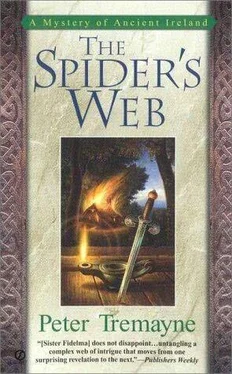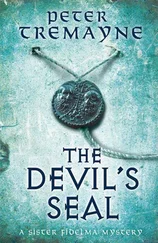Peter Tremayne - The Spider's Web
Здесь есть возможность читать онлайн «Peter Tremayne - The Spider's Web» весь текст электронной книги совершенно бесплатно (целиком полную версию без сокращений). В некоторых случаях можно слушать аудио, скачать через торрент в формате fb2 и присутствует краткое содержание. Жанр: Исторический детектив, на английском языке. Описание произведения, (предисловие) а так же отзывы посетителей доступны на портале библиотеки ЛибКат.
- Название:The Spider's Web
- Автор:
- Жанр:
- Год:неизвестен
- ISBN:нет данных
- Рейтинг книги:5 / 5. Голосов: 1
-
Избранное:Добавить в избранное
- Отзывы:
-
Ваша оценка:
- 100
- 1
- 2
- 3
- 4
- 5
The Spider's Web: краткое содержание, описание и аннотация
Предлагаем к чтению аннотацию, описание, краткое содержание или предисловие (зависит от того, что написал сам автор книги «The Spider's Web»). Если вы не нашли необходимую информацию о книге — напишите в комментариях, мы постараемся отыскать её.
The Spider's Web — читать онлайн бесплатно полную книгу (весь текст) целиком
Ниже представлен текст книги, разбитый по страницам. Система сохранения места последней прочитанной страницы, позволяет с удобством читать онлайн бесплатно книгу «The Spider's Web», без необходимости каждый раз заново искать на чём Вы остановились. Поставьте закладку, и сможете в любой момент перейти на страницу, на которой закончили чтение.
Интервал:
Закладка:
‘I have been placed in charge of the prisoner.’The young warrior flushed angrily. ‘It is my duty to …’
‘It is your duty to do as you are told.’ Fidelma’s voice was testy. ‘Go and tell Dubán, your commander, that I do not want you near this prisoner again. Go now!’
‘You cannot …’ began Crítán indignantly.
It was Eadulf who rose and, with studied gentleness, took the young warrior by the arm. Only the sudden gasp of pain and tightened jaw showed them just how much pressure Eadulf exerted.
‘Yes, we can,’ Eadulf said pleasantly. ‘You are no longer required here.’
He propelled him to the door almost in the same way that Crítán had brought his prisoner in. When Eadulf closed the door behind the young warrior he found Gadra grinning at him.
‘Pragmatic, indeed. I am sure that I like you, brother Saxon!’
Fidelma had taken no further notice but was gazing thoughtfully at Móen. She turned to Gadra.
‘While he is composing himself, I would like to know what method you are using to communicate with him. I must know whether this communication is genuine.’
Gadra grunted in annoyance.
‘Do you think I have invented all this, child?’
Fidelma gave a swift shake of her head.
‘No, I did not mean that. But I must rightly seek an assurance that this is a genuine communication from the boy for if I have to present it before a court of law then I must have a full understanding of it.’
Gadra regarded her for a moment or two and shrugged indifferently.
‘As an advocate you probably know something of the ancient Ogam alphabet.’
Fidelma’s eyes widened.
‘You use the Ogam alphabet to communicate?’
Ogam was the earliest form of writing among the people of the five kingdoms and consisted of short lines drawn to, or crossing, a base line representing the twenty characters of the alphabet. The ancients claimed that the god Ogma, patron of literacy and learning, had come to the south-west of Muman, the place of all primal beginnings, and instructed the wise ones in the use of the characters, so that they could journey through the land and even across the seas to show people how they might write. The alphabet was often inscribed on wands of hazel or aspen and many grave markers of stone were inscribed in Ogam. It hadfallen into disuse with the introduction of the new Latin learning and alphabet into the kingdoms. Fidelma had studied the old system and alphabet as part of her education for many texts were still to be found written in the archaic form.
She could suddenly see how such a simple form of alphabet might be used as a means of communication by manual gestures.
Gadra was watching her changing expression as she realised the simplicity of the form.
‘Do you want to test it for yourself?’ he asked.
Fidelma nodded eagerly.
Gadra turned to Móen and there was a quick exchange.
‘Take his palm. Hold it upright and use the line of the second digit as the base line down to the heel of the hand. Introduce yourself by writing your name in the Ogam characters.’
Fidelma cautiously took the youth’s hand.
Three strokes to the right of the base line for ‘F’; five dots on the base line with the tip of her finger for ‘i’; two strokes to the left of the base line for ‘d’; four dots on the line for ‘e’; two strokes to the left for ‘l’; a diagonal stroke across it for ‘m’ and a single dot for ‘a’. She made the movements fairly slowly and cautiously. Then she paused, awaiting a response.
The young man, an eager smile on his lips, took the left hand, which she offered him, and held it palm up. Then came his finger against the palm. A diagonal for ‘M’; two dots on the line for ‘o’; a slight pause before four dots for ‘e’ and then four strokes to the right for ‘n’. Móen.
It was so simple. And this sentient creature had been treated as if he were no more than an animal. Fidelma felt a thrill of outrage as she realised the enormity of it.
Slowly Fidelma began to spell out on Móen’s palm.
‘I am an advocate of the courts, come to investigate the murder of Eber and Teafa. Do you understand?’
‘Yes. I did not kill them.’
‘I want you to tell me what happened so far as you know.’
At once the youth began to use his fingers rapidly against her palm. So rapidly that she had to interrupt him.
‘You are too fast. I am unused to this means of communication. Speak with Gadra here and he will translate what you have to say more rapidly.’
‘Very well.’
Fidelma sat back and explained to Gadra who immediately took over. The door opened abruptly. Fidelma glanced up as Dubán entered and stood watching the proceedings in amazement. He stirred uneasily as he caught her inquiring gaze.
‘Crítán has protested to me that you …’ he began but Fidelma cut him short.
‘I am well aware of what Crítán might have reported,’ she said.
Dubán grimaced.
‘I am not without an understanding of that young man’s faults. I will see to it that he no longer stands guard over Móen, if that is your wish.’ He glanced towards Gadra and Móen. ‘It is true, then. Can he really communicate?’
‘As you see, Dubán, we can communicate with him and he with us. Would you mind waiting outside? We must accord Móen the same privacy in this interrogation that any one of us is entitled to under the law.’
Though disappointment showed on his face, the commander of the guard jerked his head in agreement and left the room.
Fidelma and Eadulf now turned back to watch with some awe and amazement as Móen’s fingers worked rapidly over Gadra’s palm. The old man would halt the flow now and then and presumably asked a question for the sake of clarification. As he did so, he began to interpret between Fidelma and Móen.
‘Tell us, Móen, did you kill Teafa or Eber?’
‘I did not.’ A pause. ‘I loved Teafa. She raised me as my mother.’
‘Will you tell us what happened that night, the time when you were made prisoner?’
‘I will try.’
‘Take your time and try to put in as much detail as you can remember.’
‘I will try. I sometimes have difficulty in sleeping. It is then I rise and go for a walk.’
‘A walk at night?’
‘Night or day makes no difference to me.’
Fidelma with a start realised that Móen was actually smiling at the joke that he had made.
‘Did you do so that night?’
‘I did.’
‘You do not know at what hour this was?’
‘Alas, I do not. Time is meaningless to me except I know when it is hot and when it is cold, when I scent certain flowers and when I scent others. I can only tell you that it was cold when I went for my walk and there was a scent of dampness but no flowers. I rose and went to the door of our cabin. I am adept at moving about quietly.’
Fidelma realised that this could be a mark against Móen. She decided to ask for amplification.
‘How well could you move around the village by yourself?’
‘Unless someone has left some object discarded on the paths, something which should not be in the way of the passes between the buildings, then I usually have no difficulty. Once or twice I have fallen over a box or something of that sort which has been left lying about. Then I rouse the dogs and people get angry. Usually I manage very well.’
‘Where did you go for your walk?’
‘I cannot tell you. I can show you by repeating it, if you like.’
‘Later. What did you do on your walk?’
‘I did little except I sat by the water where the scents are often so beautiful and caress your mind and body and soul. But there were no scents at that time.’
‘You sat by the water?’
‘Yes.’
Читать дальшеИнтервал:
Закладка:
Похожие книги на «The Spider's Web»
Представляем Вашему вниманию похожие книги на «The Spider's Web» списком для выбора. Мы отобрали схожую по названию и смыслу литературу в надежде предоставить читателям больше вариантов отыскать новые, интересные, ещё непрочитанные произведения.
Обсуждение, отзывы о книге «The Spider's Web» и просто собственные мнения читателей. Оставьте ваши комментарии, напишите, что Вы думаете о произведении, его смысле или главных героях. Укажите что конкретно понравилось, а что нет, и почему Вы так считаете.











